#ttte d199
Text
The Importance of Names in the Railway Series
It's been a hot minute since my last take on the world of Thomas & Friends - so here's one that has sort of been wandering about in the back of my mind for a while.
How important is a name to an engine? Cause we know the engines do put a lot of value into a name. Stepney and Edward say as such:
"[...] I think our Controller was right. All engines ought to have names."
"Yes," agreed Edward, "it's most important."

And it's further reinforced by Bear later in the series:
"It's nicer than just having a number," he (Bear) says. "Having a name means that you really belong."

Donald and Douglas echo this by giving themselves names (partially to fool the Fat Controller) and the interesting thing is that Sir Charles actually uses their names almost exclusively from that moment on - unless referring to them by their new numbers.
Even BoCo gives himself a name! And it feels pretty on-the-spot too, seeing as he just goes "but you can call me BoCo".
But in contrast, every single rail-based 'villain' or 'antagonist' in the Railway Series only has a number, or is Diesel, who doesn't really have a name either. Check me! There's:
Diesel
The 'Big City Engine'
Class 40 (D261/D471)
D199
D40125





None of them have names - not even 'the Big City Engine'. They're given nicknames by the engines, but otherwise they are just numbers. And I think it runs a bit deeper than that. A little while back I did a post on the 'railway rulebook' - and something I said was that managers did everything in their power to both dehumanise the engines and make the engines loyal to them. What better way of doing that than only giving certain engines names? 'Flying Scotsman' gets a name because he's a prestigious express engine, but the engine who shunts his coaches? The goods engine who brought his coal? Why would management give them names - to do that is to undermine the class system they've built to keep the engines fighting amongst themselves. If the engines are on equal footing, then they'd want equal rights.
You know... this sounds a lot like the Communist Manifesto. I don't think the Rev. W. Awdry intended it that way, but it does.
But that's beside my point. Certain railways either don't want their engines to have names. In particular, I would point at the LMS and the LNER, which both had a massive roster of engines. Not only is recording all their names a pain, but it would also add a sense of individuality to them and muck up their spreadsheets. In most countries, people have an ID number for identification - and that's what these companies needed. Not names; numbers.

The GWR is a notable exception to this, and I think people have noticed that. Both Duck and Oliver arrive with names, and Sir Topham I was a Swindon-apprentice who would have grown up with GWR ideology. Edward got his name because he was built as an express engine, Henry and Gordon for the same reasons - and everyone else either gives themselves names or have names given to them.
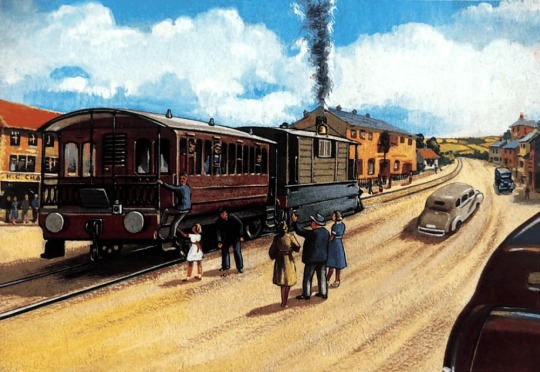
Toby probably got his from his crew and the locals after decades of being in the same area - I mean, he literally runs into their town, of course they have a name for him. Percy is given his by Sir Topham, and we can infer Thomas and James got similar treatment. Donald and Douglas gave themselves names, and so did BoCo.
Another possibility is that a preservation society would give engines names, though that was more the engines on said heritage line - like in Stepney the Bluebell Engine, where Stepney refers to all his friends on the Bluebell by name, and says his controller gave out some names, like Bluebell and Primrose - but Adams and Cromford got their names from the other engines and they don't want the controller finding out. And again, Stepney and Edward both explicitly say that they believe engines ought to have names - and that they believe it really makes an engine feel like family.
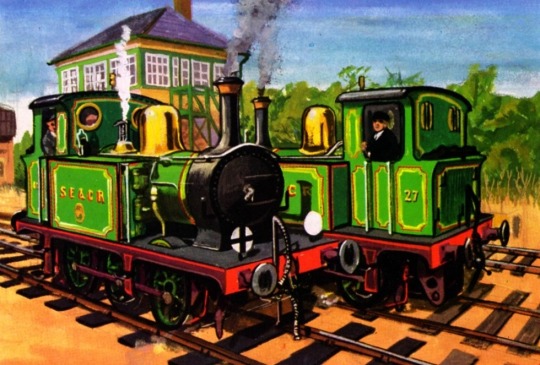
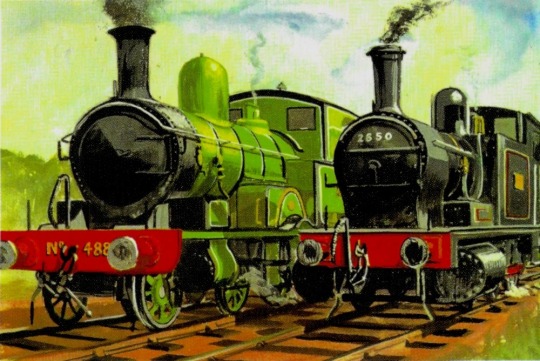
This almost exclusively applies to engines in a steam-dominated society, and once again I have to return to my old nemesis: early British Railways. British Railways inherited a massive network that spanned a continent and had thousands of engines - not to mention the fact they were going to scrap all their steam engines and replace them with new diesel engines. Names were never ever going to be viable. But moreover, they were going to kill all the steam engines - if these engines were seen by the public to be very sentient and intelligent, then there would be an outcry. Dehumanising these engines was extremely important to their business model.
So almost every new engine built under BR got no name. And that includes steam and diesel engines. And this sort of environment, where engines referred to each other by number, became standard.
Names have a lot of meaning behind them. We give names to things we believe are very valuable to us, things we really bond with, like a teddy bear or a beloved family car. Names confer a level of love and care, as opposed to numbers, which have a level of 'repetitive factory conveyor belt' to them, for lack of a better term. These engines, referring to each other by number, didn't sound as human as those referring to each other by name.
For a good example, as mentioned above, the GWR gave all its engines names - and the GWR has the most engines from its company preserved. The fact that people knew these engines had names, and possibly by name, really contributed to how many were saved.

But what makes it even more interesting is the fact that often engines give each other names. Bear is given his name by the other engines, Duck is a nickname given to 'Montague' because he waddles. And I think the reason that none of these diesels have names is because no steam engine ever gave them a name, and company policy means no diesel has the mindset for giving out names either. Steam engines give each other names, but it becomes exclusive to them and friendly diesels, and thus dies out over the generations.
Engines today don't have names. They don't even really have a proper visible number. They have a serial number somewhere, but that's about it. And I think that says a lot about what happened to the tradition of names for engines.
To sum up a very long, winding ramble, I think names came from several places:
Themselves. Engines could name themselves, like Donald and Douglas - who got their names from (maybe) former drivers?
From crew and community. Toby most likely got his name from the people around him, being on an isolated tramway.
From their owners. Flying Scotsman, Mallard and Percy are good examples of this. It represents a level of importance and care for this engine, as well as in some cases reinforcing class.
From other engines. Duck and Bear are great examples of this, as they are given names by their friends that they like, as it makes them feel as if they fit in.

And these names were very common in the steam era as engines gave each other names and communities knew specific engines and gave them names. As everything became more commercial and bureaucratic, naming was lost. Numbers reinforced company identity and dehumanised the engines to make them less sympathetic to the public. Look at Donald and Douglas, who probably had their names for decades - given by their friends - but never learnt by management.
Wow, that took a bit of a dark turn. Thanks for reading, and as usual, none of the above pictures are mine.
#fanfiction writer#railway series#thomas the tank engine#weirdowithaquill#railways#the railway series#ttte stepney#ttte bear#ttte donald#ttte douglas#ttte diesel#ttte d199#bowler#ttte duck#The Great Western Railway#gwr#The Bluebell Railway#names#names for trains#why do only some engines have names?#ao3 stuff#rws headcanon#ttte analysis#very long post#long reads#british rail
159 notes
·
View notes
Text
Spamcan/D199 Headcanons & Analysis
While writing this fic and replying to folks’ lovely comments, I thought a lot about Spamcan and what makes him distinct to me. I feel like he’s different from the other rude diesel antagonists.
In my opinion, what sets him apart is that he has a companion. Bowler and Old Stuck Up arrive alone while Spamcan shares his trial with Bear. He also says “we” and “our controller” to Bear. There’s familiarity between them; he thinks of themselves as a package deal.
Bear validates this: “Shush! It’s their railway.” He doesn’t agree with Spamcan’s bigotry, but he still calls the NWR “their” railway. He’s aligning himself along lines of “us and them,” suggesting he and Spamcan are on the same “side” to some degree. He also considers themselves a package deal, even if he’s frustrated with it.
So how did these two become acquainted?
Well, Bear is a diesel-hydraulic engine — a type BR declares non-standard. Spamcan is a diesel-electric, safe for now from the cutter’s torch, but Bear’s position is much more fragile.
Considering what we see of Spamcan, he doesn’t seem like he’d befriend Bear for altruistic reasons. Yet he still refers to himself and Bear as a “we.” He even worries about what Bear thinks of him after he breaks down with his oil tankers.
And that’s what I think is at the root of this. Spamcan doesn’t care about Bear, but about what Bear thinks of him. He cares about maintaining a self-image that convinces Bear to stay with him, to keep following him.
Spamcan wants Bear to be dependent upon him.
I imagine their dynamic on BR was Spamcan demanding Bear’s loyalty in exchange for protection. And by protection, I mean dumping his work on Bear with the excuse of keeping him “out of sight, out of mind” from their controller. Bear didn’t have any better options, so he went along with it. Now he’s at the end of his rope.
But my pre-canon musings aside, do you see what I’m getting at? Spamcan’s one manipulative son of a gun!
He utilizes Bear’s threatened status to keep him close, to have someone who backs up what he says. His use of chummy plural pronouns is a strategy to wear down Bear’s sense of individuality. He tries to create camaraderie while also diminishing him, reducing him to a satellite in his orbit.
Spamcan is arrogant and boastful, but he has a degree of subtlety, too. That’s something that Bowler and Old Stuck Up never managed. The fact they came alone on their trials suggests they don’t have any followers or “friends” of their own, any of Spamcan’s finesse.
But you know who does manage some of that finesse? Diesel.
I like to think that Spamcan hears the story of Diesel’s trial. To him, it’s clear that Diesel worked the best when he flattered other engines and made himself indispensable to them. Messing with the trucks backfired in the end, but Spamcan would never do such a foolish thing. He can do one better than Diesel.
It’s not Spamcan’s plan to go to Sodor — he would rather stay on a “modernized” railway — but he figures it’s his duty to spread modernization. Like a “good diesel,” he volunteers himself with Bear for the trial. The Sodor engines will be on guard now, so who better to go with him than the fellow diesel to which he made himself invaluable? It’ll ensure someone has his back in hostile territory.
Spamcan’s miscalculation is in assuming that Bear will be grateful for recommending him to go on trial, winning him more points with him. But on BR, Bear was vulnerable. Now that he’s on Sodor, he has a chance of getting to safety. He doesn’t need Spamcan’s protection.
And every time Spamcan tries to appeal to him, he’s showing himself at his nastiest. Bear’s personal morals aside, if Spamcan hates “outdated” steam engines, how long will it be before he turns on “non-standard” diesels? How long will it be before Bear stops being useful to BR and to Spamcan?
When Bear tells Spamcan to shut up, he loses his only support right as he makes enemies out of every steam engine on this island. He’s alone and it’s all his own fault, all because he assumed he could manipulate his way out of any situation.
In that way, Spamcan isn’t too different from the other rude diesel antagonists. He fails because he’s arrogant and discriminatory. He fails because our protagonists resist swollen egos and prejudice where they see it.
But I like to think I’ve made a decent case for the ways he is different. I think he’s a bit subtler, a bit more manipulative than the others, even if he’s no more successful. What do you guys think? :)
#ttte#rws#the railway series#ttte headcanon#rws headcanon#my headcanons#ttte character analysis#rws character analysis#my analysis#ttte d199#ttte spamcan#ttte bear#ttte diesel#long post#I hope this makes sense#going to collapse into bed now okay good night
60 notes
·
View notes
Text
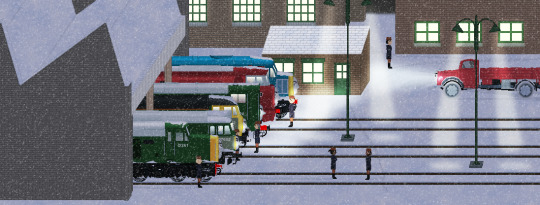
[1966]
“You're back late, aren’t you?”
“Some Ivatt Mogul derailed just outside a yard.” Diesel 7603 grunted. “Cost me and like three other engines like an hour and a half.”
“Damn. Won't have to deal with that for much longer.”
“Deal with what?” The big green diesel spoke up.
“You haven't heard?” Diesel 8028 replied, dismissively. “They're doin’ away with steam engines. By this time next year, steam won't even be allowed on the main line.”
The diesel blinked. “Doing away with? Not like they’re doing now, right…?”
“Not at all.” 8028 rolled his eyes. “We’re talking complete removal. They’ll all be disappearing.”
“Disappearing…?”
“So too will all that congestion in the scheduling.” Diesel 7603 remarked at the same time, drowning out The Diesel’s discontented comment.
The “Whistler” remained quiet after that. He paid little attention to the coarse joking and rude remarks about steam engines from his fellow shedmates. A lonely, strangled goods yard, and several hollering, howling voices still echoed within his radiator.
#ttte#thomas and friends#thomas the tank engine and friends#railway series#rws#british railways#ttte d261#ttte d199#ttte oc d8028#ttte oc d7603#tte oc crovan#not quite sure how to write br diesels#what if some br diesels had survivors guilt#it would be fun i think
16 notes
·
View notes
Text
Arthur got a bit hungry, so he grabbed a bite to eat lol
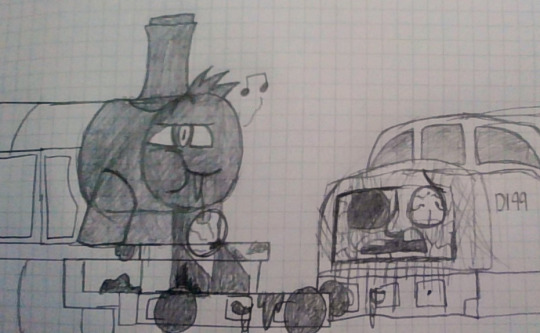
(And yea, i gave him a tuff of hair on him, I think it looks neat on him)
2 notes
·
View notes
Text
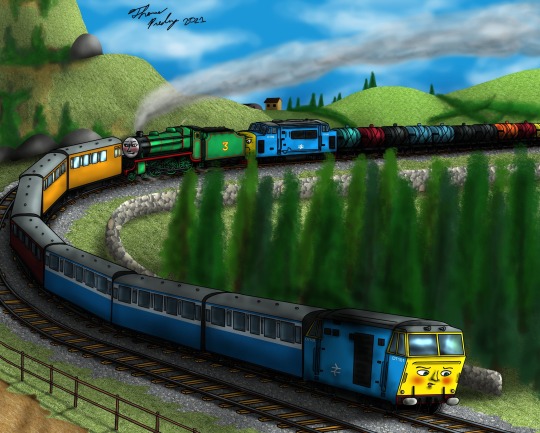
"So with 7101 growling in front, and Henry gamely puffing in the middle, the long cavalcade set out to the next big station."
From book 23: Enterprising Engines, based off of probably the most beloved Railway Series story to never get adapted for TV - Super Rescue!
#thomas the tank engine#ttte#ttte fanart#ttte thomas#thomas#thomas and friends#the railway series#henry the green engine#7101#d199#spamcan#super rescue#RWS
50 notes
·
View notes
Text
been a while since i made trainz stuff
cuz ya know, wanted to try out the new Bear model from Ashford Works
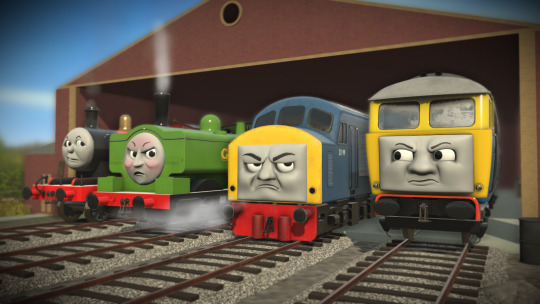
#they be angrey#thomas and friends#duck the great western engine#james the splendid engine#d199#spamcan#bear ttte
21 notes
·
View notes
Photo
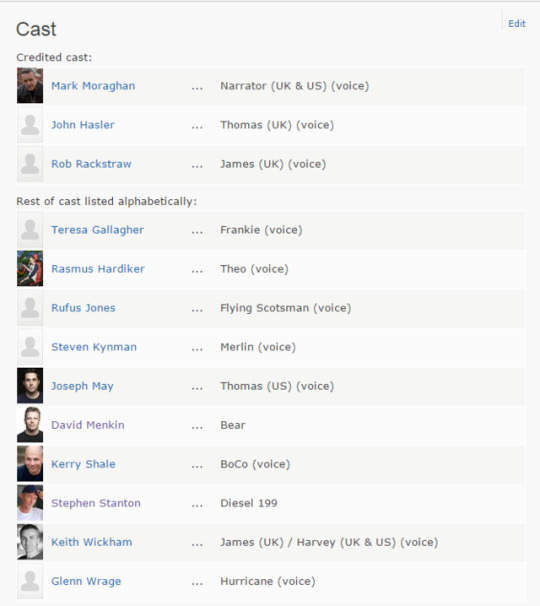
Hmmm...
#ngl this is very likely fake#look they didn't even add (voice) to bear and d199#thomas the tank engine#thomas and friends#journey beyond sodor#ttte
19 notes
·
View notes
Text
For Traintober 2023, Day 31: “Lights Out”
————
While awaiting their repairs in the works, Henry reassures D7101. He doesn’t expect D7101 to repay the favor so soon.
#ttte#rws#the railway series#ttte fic#rws fic#my fic#traintober#traintober 2023#ttte henry#ttte bear#ttte d199#ttte spamcan#ttte james#ttte sir topham hatt#ttte the fat controller#ttte sir charles topham hatt ii#i hope you all enjoy!
19 notes
·
View notes